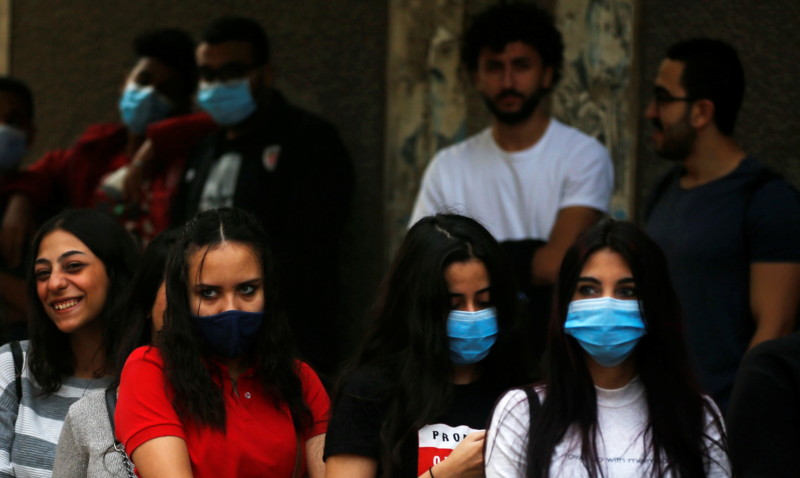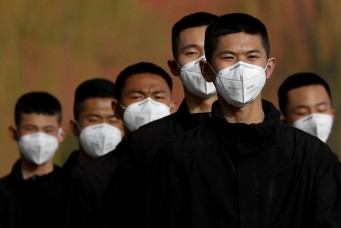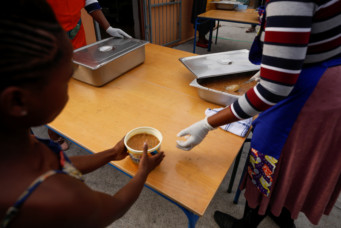Learning from a Diplomatic Trailblazer to Tackle Global Inequalities
Guest speaker at the 16th Nadia Younes Memorial Lecture, Dutch Minister Sigrid Kaag, presented ideas for geopolitical challenges in the Middle East and North Africa during and after the coronavirus pandemic.

Women and men wearing face masks amid the coronavirus disease (COVID-19) outbreak wait in separate lines to cast their votes, outside a school used as a polling station during the second round of Egypt’s parliamentary election, in Cairo, Egypt, November 7, 2020. Amr Abdallah Dalsh/Reuters
Tragedy can at times lead to rich intercultural dialog and, often, catharsis. This has been the case after the death of Ambassador Nadia Younes (1946 – 2003), one of the Arab world’s brightest diplomatic icons. Younes, chief of Staff for the Special Representative of the UN Secretary General to Iraq (2003), along with 21 others, died in the August 19, 2003 Canal Hotel Bombing in Baghdad, Iraq. Perpetrated by unknown extremists, the attack was aimed at dislodging the United Nations presence in Iraq and around the world. Unbowed by the horror of the attack, the belief in the international peace process led by the UN continues to live on. With the support of her family and the American University in Cairo (AUC), Younes’ support for cross cultural idea exchange has been voiced at the annual Nadia Younes Memorial Lecture, first held in 2004.
Due to the coronavirus, this year’s lecture came in the form of an online webinar featuring guest speaker Dutch Minister for Foreign Trade and Development Cooperation Sigrid Kaag in attendance virtually.
Kaag began by referring to Younes as a trailblazer whose work has touched and transformed the world. “In the words of former UN Secretary-General Kofi Annan, spoken here at the first Memorial Lecture, Nadia ‘brought with her everywhere a special Arab brand of enlightenment and tolerance—only to fall victim, in the end, to a special brand of extremism and intolerance’,” Kaag said.
Kaag recalled the words of 14th century Arab intellectual Ibn Khaldun who said that the past closely resembles the future, in that it is cyclic and reproduces itself. Kaag said that she was not sure Ibn Khaldun’s idea of a fatalistic repeating of past events in the future was true in our modern age.
She believes that personal decisions have more to do with how the world will change in the future. As opposed to Ibn Khaldun’s vision, Kaag believes that the future will not resemble the past. “In our present age, the steps we take as individuals echo along the paths we take as societies,” she said.
Younes lived and died for the UN and the ideals which the international organization stands for, often exhibiting a rare humor and wit which many remember. “It was said that she would tell Bill Clinton where to stand, and Vladimir Putin what to wear,” Kaag said.
While she never told President Putin what to wear or former-President Clinton where to stand, Kaag stated that like Younes, she too attended AUC and had the chance to connect to Egypt and the Middle East and North Africa. She stated, “My time here has given me strong ties to this region and its people. I have happily spent a large part of my life and career here. In spite of its many difficulties and contradictions, it is a beautiful region whose past and future hold much promise. But also much pain.”
Unfortunately, the COVID-19 pandemic has brought existent conflicts to the fore.
COVID-19’s Deeper Impacts in the Middle East
Kaag stressed that the biggest effects of the COVID-19 pandemic on Middle Eastern countries has been the exaggeration of already existing social inequalities. Economies have come to a stop and the world is focused on finding a vaccine and fighting the virus but this singular vision has hurt the wider attention of regional policy-makers in addressing gender inequality, economic stratification, human rights and vulnerabilities of minorities and displaced persons.
She acknowledged that many governments in the MENA region had less than stellar records in the above areas of inequality. “If we look at the statistics alone, we find that the Middle East and North Africa region ranks lowest in the most recent Economist Democracy Index. Challenging geopolitical circumstances, economic stagnation and endemic corruption afflict many states throughout the region,” Kaag said.
“All of these factors have long fed growing public unrest, which has, from time to time, erupted into public protests. This discontent and marginalization continues to make itself felt.”
The long-ranging economic effect of the pandemic is in itself a concern. The Minister stressed that the International Monetary Fund (IMF) predicts that the MENA region will lose 4.1 percent of its Gross Domestic Product (GDP) in 2020 alone. This will be, according to Minister Kaag, the lowest forecast of the IMF in 50 years. “The weakest shoulders will have to carry the heaviest load. This will be felt in refugee camps, and migrant communities—themselves the result of long-running conflicts and fragility.
According to the United Nations High Commissioner for Refugees (UNHCR), there are currently 16 million internally displaced persons and refugees in the Middle East and North Africa,” she added.
One of the worst effects of the pandemic will be that women will suffer more than men. Kaag related that as more than half of the global female labor force works in the informal economy sector, they do not qualify for any social safety net. “When economies shut down, this group is most vulnerable, and worst affected. At the same time, gender-based violence has dramatically increased, as people spend more time in their homes. This poses a serious danger to women who live with abusive partners or family members,” she warned.
The Dutch minister stressed that young people have also been hit hard by the virus and the resulting global lockdown. International agencies have reported that millions of children in the region will not return to school once the lockdown ends.
Presently one major challenge is the 37 million children in the MENA region who do not have access to remote learning. This present lack of education and the possibility that many of these children will not return to school, means that there is a chance for the creation of a “lost generation” which will be undereducated and underemployed. Kaag stressed that moving forward, if young people in a post-coronavirus world do not find ways to improve their lives, they will either force change or try to leave their nations.
“I want to stress that, although the situation is serious, it also offers opportunities for change… Over the last few years we have seen the power of young people. The strength of their voices, and the beauty of their convictions. As young people around the world marched against climate change, and for social justice, they managed to reshape the international agenda.”
Kaag underscored the need to listen to young people in addressing the MENA region’s problems. “It is young people who show societies the best way forward, and so it is to young people that we should listen. This means giving them a greater say in policy and politics. Investing in education and youth employment.”
She Who Inspires Catharsis
In discussing the final effects of the coronavirus, Kaag referenced Aristotle who explained that following tragedy there comes catharsis which is a cleansing experience that moves us beyond fear and grief, and helps us face the world again.
“The great medieval Arab philosopher Ibn Rushd (also) wrote about catharsis. He believed that it ‘makes souls become tender and prompts them to accept virtues’,” she added.
Kaag said this spirit of catharsis reminded her of the inspirational leader Nadia Younes, “Her tragedy has left a deep mark. But that mark now inspires others to follow in her footsteps.”
Before being appointed to her present position as a minister in 2017, Kaag was active at a number of diplomatic posts with the most prestigious being the UN Special Coordinator for Syria (2013 – 2014) and the UN Special Coordinator for Lebanon (2015 – 2017).



